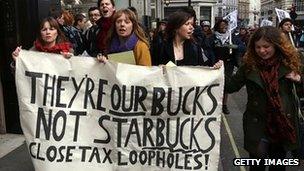Oxfam urges G20 to curb tax avoidance that harms Africa
- Published

Tax avoidance by big firms sparked protests in London earlier this year
Urgent action is needed at Thursday's G20 summit in St Petersburg to fix a tax system allowing firms to "rip off" poor African nations, Oxfam has warned.
Such countries were losing almost 2% of national income in tax not paid by firms, depriving them of billions of pounds, the charity said.
It urged leaders to "tear down walls of secrecy" that allow tax dodging.
The UK Treasury said the summit must build on June's G8 summit when the PM put tax "at the heart" of the agenda.
Oxfam said the lost income of African countries through tax dodging was the equivalent of more than half of the money spent on health by governments throughout sub-Saharan Africa.
If the G20 countries meeting on Thursday lost the same proportion of GDP it would cost them £770bn - and the UK £26.6bn, it calculated.
"The G20 should be ashamed to be at the helm of an economic system that allows companies to rip off Africa to this extent," the charity's head of development finance and public services Emma Seery said.
"It is an outrage that the poorest countries not only suffer this, but are not even invited to the table to take part in tax talks."
She added: "If G20 leaders are serious about making sure companies pay their way, this summit will agree to a deadline to end tax secrecy for corporate giants and phantom firms."
'Tackle avoidance'
Oxfam called on world leaders at the G20 to do more to support an automatic system for exchanging tax information to allow both rich and poor countries to access tax information.
It also urged agreement on ending "phantom firms" to make sure company ownership could no longer be a secret.
And it said leaders should agree to country-by-country reporting for all multinational companies to ensure transparency about where they pay taxes.
A UK Treasury spokeswoman said the G8, under Britain's chairmanship, had asked the Organisation of Economic Co-operation and Development (OECD) to "create a common template that would require companies to report where they earn their profits and pay their taxes, giving tax authorities more of the information they need to tackle tax avoidance by multinationals".
"This will be particularly helpful to the governments of developing countries," she said.
"At the G20 finance ministers meeting in July, we were clear that the next step is to build on the G8's success and in St Petersburg this week we will be looking for G20 leaders to back the establishment of this common template."
- Published20 July 2013
- Published19 July 2013
- Published23 June 2013
- Published21 May 2013
- Published4 December 2012